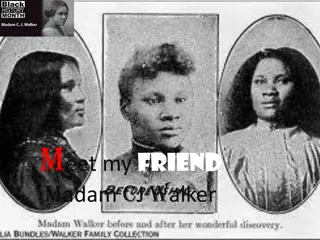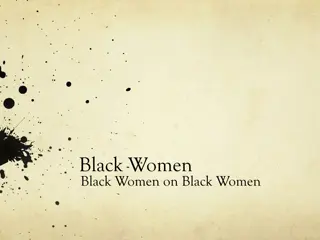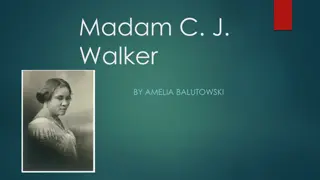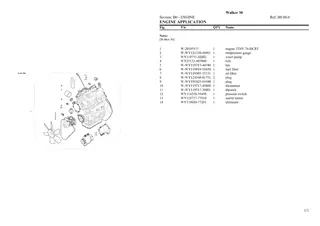ALICE WALKER
Alice Walker, born in 1944, is a renowned American novelist, short story writer, poet, and activist. Despite facing challenges, she found solace in writing and went on to achieve literary success with works like "The Color Purple". Walker's experiences and resilience continue to inspire readers worldwide as she champions feminist and womanist ideals.
Download Presentation

Please find below an Image/Link to download the presentation.
The content on the website is provided AS IS for your information and personal use only. It may not be sold, licensed, or shared on other websites without obtaining consent from the author.If you encounter any issues during the download, it is possible that the publisher has removed the file from their server.
You are allowed to download the files provided on this website for personal or commercial use, subject to the condition that they are used lawfully. All files are the property of their respective owners.
The content on the website is provided AS IS for your information and personal use only. It may not be sold, licensed, or shared on other websites without obtaining consent from the author.
E N D
Presentation Transcript
Alice Walker (born February 9,1944) is an American novelist,short story writer,poet,and activist.She wrote the novel The Color Purple (1982), for which she won the National Book Award for hardcover fiction, and the Pulitzer Prize for Fiction. She also wrote the novels Meridian (1976) and The Third Life of Grange Copeland (1970),among other works.An avowed feminist,Walker coined the term "womanist" to mean "A black feminist or feminist of color" in 1983. At age eight, Walker was accidentally injured by a BB gun shot to her eye by her brother. Her partial blindness caused her to withdraw from normal childhood activities and begin writing poetry to ease her loneliness. She found that writing demanded peace and quiet, but these were difficult things to come by when ten people lived in four rooms. She spent a great deal of time working outdoors sitting under a tree.
Walker attended segregated (separated by race) schools which would be described as inferior by current standards, yet she recalled that she had terrific teachers who encouraged her to believe the world she was reaching for actually existed. Although Walker grew up in a poor environment, she was supported by her community and by the knowledge that she could choose her own identity. Moreover, Walker insisted that her mother granted her "permission" to be a writer and gave her the social, spiritual, and moral substance for her stories.
In 1968, Walker published her first collection of poetry, Once. Walker's teaching and writing careers overlapped during the 1970s. She served as a writer-in-residence and as a teacher in the Black Studies program . While teaching she was at work on her first novel, The Third Life of Grange Copeland (1970). She then moved north and taught at Wellesley College, in Massachusetts, and the University of Massachusetts at Boston (both 1972 73). In 1973 her collection of short stories, In Love and Trouble: Stories of Black Women, and a collection of poetry, Revolutionary Petunias, appeared. She received a Radcliffe Institute scholarship (1971 73),a Rosenthal Foundation award,and an American Academy and Institute of Arts and Letters award (both in 1974) for In Love andTrouble. In 1976 Walker's second novel, Meridian, was published, followed by a Guggenheim award (in 1977 1978). In 1979 another collection of poetry, Goodnight, Willie Lee, I'll See You in the Morning, was published, followed the next year by another collection of short stories, You Can't Keep a Good Woman Down (1980). Walker's third novel, The Color Purple was published in 1982, and this work won both a Pulitzer Prize and the American Book Award the following year. Walker was also a contributor to several periodicals and in 1983 published many of her essays, a collection titled In Search of Our Mother's Gardens:A Collection ofWomanist Prose (1983).Walker worked on her fourth novel while living in Mendocino County outside San Francisco,California.
Walker's third and most famous novel, The Color Purple, is about Celie, a woman so down and out that she can only tell God her troubles, which she does in the form of letters. Poor, black, female, alone and uneducated, held down by class and gender, Celie learns to lift herself up from sexual exploitation and brutality with the help of the love of another woman, Shug Avery. Against the backdrop of Celie's letters is another story about African customs.This evolves from her sister Nettie's letters which Celie's husband hid from Celie over the course of twenty years. Here, Walker presented problems of women bound within an African context, encountering many of the same problems that Celie faces.Both Celie and Nettie are restored to one another,and,most important,each is restored to herself.
For many readers, she is best known as a beloved figure in the literary world, a poet and author of the Pulitzer Prize-winning novel The Color Purple, which was adapted into a film featuring OprahWinfrey and a Broadway show. Ms. Walker, 74,is also a longtime political activist and vocal feminist, known for her work with the NAACP and for taking stands on social justice issues. She has also been an outspoken critic of Israel s treatment of Palestinians, even comparing the country to Nazi Germany. Jewish groups including the Anti-Defamation League have been monitoring Walker s talks and writing for years.
LEGACY Alice Walker's works are known for their portrayals of the African American woman's life. She depicts vividly the sexism, racism, and poverty that make that life often a struggle. But she also portrays as part of that life,the strengths of family,community,self-worth,and spirituality. Many of her novels depict women in other periods of history than our own. Just as with non-fiction women's history writing, such portrayals give a sense of the differences and similarities of women's condition today and in that other time. Alice Walker continues not only to write but to be active in environmental, feminist/womanist causes,and issues of economic justice.Her latest novel,"Now is the Time to Open Your Heart," was published in 2004; since that time her published work has been poetry. Her latest collection of poems,titled "Taking theArrow Out of the Heart," was published in 2018.
Walkers works depict the inner strengths of the Black women who manage to survive and flourish spiritually. The true terror of the Black people is within the mutilation of the body and spirit than the external facts and figures of subjugation. In her writing, Walker deals with the external realities of poverty, exploitation and discrimination. However, most often her stories, novels and poems highlight on the intimate reaches of the inner lives of her characters. Her womanist spirit is critically examined through her fictional works. Her novels are studied and analyzed from the point of view of artistic damage done by white Americans. Walker presents the complexity of human experiences in the White community. She explores the pain and violence that has marked many Black people's lives.Walker believes that positive changes are possible,when black men and women stand shoulder to shoulder working to end oppression both in their relationships and in the world.Her effort is to make her reader to understand the struggle of African-Americans through her short stories and fiction.
. Black American women in the antislavery and women's rights movements of the nineteenth century contributed in two centuries of freedom struggles. The Black and women s rights movements of the 1960s and 1970s,up to present Black Feminist Movement hindered the Black women s growth. . The terms feminism, Black feminism, African-American feminism and womanism are used to present the issues of Black African-American women's claim for social, political and economic equality. .It is the yearning for a friendly and progressive vision of social justice based on continuing fights against the race and gender. The comprehensive descriptions of gender discrimination delved into the intersections of gender and race.
THEMES The Power of Narrative and Voice Walker emphasizes throughout the novel that the ability to express one s thoughts and feelings is crucial to developing a sense of self. Initially, Celie is completely unable to resist those who abuse her. Remembering Alphonso s warning that she better not never tell nobody but God about his abuse of her, Celie feels that the only way to persevere is to remain silent and invisible. Celie is essentially an object, an entirely passive party who has no power to assert herself through action or words. Her letters to God, in which she begins to pour out her story, become her only outlet. However, because she is so unaccustomed to articulating her experience, her narrative is initially muddled despite her best efforts at transparency. In Shug and Sofia, Celie finds sympathetic ears and learns lessons that enable her to find her voice. In renaming Celie a virgin, Shug shows Celie that she can create her own narrative, a new interpretation of herself and her history that counters the interpretations forced upon her. Gradually Celie begins to flesh out more of her story by telling it to Shug. However, it is not until Celie and Shug discover Nettie s letters that Celie finally has enough knowledge of herself to form her own powerful narrative. Celie s forceful assertion of this newfound power, her cursing of Mr. ______ for his years of abuse, is the novel s climax. Celie s story dumbfounds and eventually humbles Mr. ______, causing him to reassess and change his own life. Though Walker clearly wishes to emphasize the power of narrative and speech to assert selfhood and resist oppression, the novel acknowledges that such resistance can be risky. Sofia s forceful outburst in response to Miss Millie s invitation to be her maid costs her twelve years of her life.Sofia regains her freedom eventually,so she is not totally defeated,but she pays a high price for her words.
THEMES The Power of Strong Female Relationships Throughout The Color Purple, Walker portrays female friendships as a means for women to summon the courage to tell stories. In turn, these stories allow women to resist oppression and dominance. Relationships among women form a refuge, providing reciprocal love in a world filled with male violence. Female ties take many forms: some are motherly or sisterly, some are in the form of mentor and pupil, some are sexual, and some are simply friendships. Sofia claims that her ability to fight comes from her strong relationships with her sisters. Nettie s relationship with Celie anchors her through years of living in the unfamiliar culture of Africa. Samuel notes that the strong relationships among Olinka women are the only thing that makes polygamy bearable for them. Most important, Celie s ties to Shug bring about Celie s gradual redemption and her attainment of a sense of self.
THEMES The Power of Strong Female Relationships Throughout The Color Purple, Walker portrays female friendships as a means for women to summon the courage to tell stories. In turn, these stories allow women to resist oppression and dominance. Relationships among women form a refuge, providing reciprocal love in a world filled with male violence. Female ties take many forms: some are motherly or sisterly, some are in the form of mentor and pupil, some are sexual, and some are simply friendships. Sofia claims that her ability to fight comes from her strong relationships with her sisters. Nettie s relationship with Celie anchors her through years of living in the unfamiliar culture of Africa. Samuel notes that the strong relationships among Olinka women are the only thing that makes polygamy bearable for them. Most important, Celie s ties to Shug bring about Celie s gradual redemption and her attainment of a sense of self.
THEMES The Cyclical Nature of Racism and Sexism Almost none of the abusers in Walker s novel are stereotypical, one-dimensional monsters whom we can dismiss as purely evil. Those who perpetuate violence are themselves victims, often of sexism, racism, or paternalism. Harpo, for example, beats Sofia only after his father implies that Sofia s resistance makes Harpo less of a man. Mr. ______ is violent and mistreats his family much like his own tyrantlike father treated him. Celie advises Harpo to beat Sofia because she is jealous of Sofia s strength and assertiveness. The characters are largely aware of the cyclical nature of harmful behavior. For instance, Sofia tells Eleanor Jane that societal influence makes it almost inevitable that her baby boy will grow up to be a racist. Only by forcefully talking back to the men who abuse them and showing them a new way of doing things do the women of the novel break these cycles of sexism and violence, causing the men who abused them to stop and reexamine their ways.
THEMES The Disruption of Traditional Gender Roles Many characters in the novel break the boundaries of traditional male or female gender roles. Sofia s strength and sass, Shug s sexual assertiveness, and Harpo s insecurity are major examples of such disparity between a character s gender and the traits he or she displays. This blurring of gender traits and roles sometimes involves sexual ambiguity, as we see in the sexual relationship that develops between Celie and Shug. Disruption of gender roles sometimes causes problems. Harpo s insecurity about his masculinity leads to marital problems and his attempts to beat Sofia. Likewise, Shug s confident sexuality and resistance to male domination cause her to be labeled a tramp. Throughout the novel, Walker wishes to emphasize that gender and sexuality are not as simple as we may believe. Her novel subverts and defies the traditional ways in which we understand women to be women and men to be men.






























